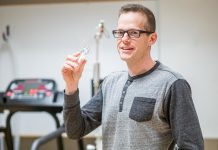May 2008 - Researchers at the Joslin Diabetes Center who reported earlier this year that an inexpensive, non-steroidal anti-inflammatory drug called salsalate might prevent type 2 diabetes are now reporting that the drug may also be beneficial in the treatment of the disease.
The paper, which appears in the May 2008 issue of the journal Clinical and Translational Science (CTS), reports on three proof-of-concept studies that demonstrate that salsalate, which has been used for decades to treat arthritis, may benefit patients with type 2 diabetes by lowering blood sugar and reducing inflammation.
"These are the first studies showing that potentially safe and tolerable doses of salsalate lower blood sugars and have other favorable effects in patients with type 2 diabetes," notes Allison B. Goldfine, M.D., Director of Clinical Research at Joslin and Associate Professor at Harvard Medical School, and senior author of the report.
Goldfine was also the lead researcher for an earlier study, published in the February issue of Diabetes Care, which demonstrated that salsalate may prevent type 2 diabetes by lowering blood glucose and reducing inflammation.
Together, these four proof-of-concept studies have led to three large, ongoing multi-center clinical trials that seek to confirm the benefit of targeting inflammation using salsalate to lower glucose in patients with type 2 diabetes or who are at risk for diabetes, or to reduce atherosclerosis in patients with coronary artery disease.
Continue Reading Below ↓↓↓
The clinical studies are a direct extension of the findings of study co-author and collaborator Steven Shoelson, M.D., Ph.D., Helen and Morton Adler Chair, Head of the Section of Cellular and Molecular Physiology at Joslin, and Professor at Harvard Medical School. Dr. Shoelson studies the molecular pathogenesis of type 2 diabetes and the role of obesity in promoting diabetes and other metabolic conditions, including atherosclerosis.
It had originally been noted nearly 150 years ago that salicylates could lower blood glucose levels, but this had either been forgotten or ignored. Dr. Shoelson�s laboratory used this as clue to probe potential reasons why obesity promotes disease. They found that the inflammatory pathway regulated by NF-kB is activated in animals with obesity and diabetes.
They went on to demonstrate that this pathway could be inhibited using salicylates, thus showing that the effects of obesity are mediated through inflammation. This was not an accepted concept at the time, and is still debated in field.
Studies in animals showed that high doses of salicylates, including aspirin, could be effective, but since these could not be used safely in patients due to the risk of stomach upset and bleeding the researchers considered alternative drugs. Together, Drs. Goldfine and Shoelson opted to study salsalate, which is a salicylate similar to aspirin but that does not cause stomach upset or bleeding.
Shoelson notes that the studies now being reported in CTS provide a 'smoking gun' - new evidence that incriminates inflammation as a major pathogenic mediator in type 2 diabetes - as well as a potentially safe new way to treat the disease.
"It is rare to see basic discoveries move from bench to bedside so quickly. This was fueled by at least two things, first the ready availability of a safe drug, and second the environment at the Joslin Diabetes Center which is ideally suited to rapid advancements in clinical discovery," he said.
Goldfine further opines, "much of the pharmacokinetic and long-term safety data for salsalate is already established, so clinical studies could move forward rapidly."
"Our findings are potentially very exciting because we show that a medication that treats inflammation may also treat diabetes and related medical conditions," said Goldfine. "If we can show in the larger clinical trials now underway that it is safe and effective, it means salsalate may be a new way to treat diabetes."
In the paper out today, two of the studies involved small numbers of patients with type 2 diabetes. One tested salsalate on seven subjects at a dose of 4.5 grams per day, while the other used 3 grams per day on nine subjects. Patients in both groups showed benefits such as reductions in blood sugar between 10 and 20 percent, but improvements were greatest in the group taking the higher dose. Glucose utilization also improved in both groups, although those taking the higher dose showed a 50 percent improvement, compared to 15 percent for those on the lower dose. The studies ran for two weeks each.
Impressive reductions were also seen in circulating levels of triglycerides and free fatty acids, particularly at the higher dose. This is important because patients with diabetes often have elevated lipid levels that potentially contribute to complications of type 2 diabetes.
Continue Reading Below ↓↓↓
The third study, a double blind, placebo-controlled trial that ran for four weeks, involved eight patients on the drug and nine on placebo. Study participants on the drug showed improvements similar to those reported in the patients in the other two studies analyzed.
In an accompanying commentary, Barry J. Goldstein, M.D., of the Division of Endocrinology, Diabetes and Metabolic Diseases, Jefferson Medical College, wrote: "The testing of a commonly used class of drugs, with a well-known safety profile, offers an exciting translational approach that promises to help in the management of glycemia in type 2 diabetes."
He noted: "A world-wide epidemic of type 2 diabetes is underway that shows no signs of remitting in the next several years. In order to address the basic therapeutic needs of these millions of patients, additional treatment options will need to be made available, especially to have some hope of getting the majority of patients to accepted glucose treatment goals."
The studies were funded by grants from the National Institutes of Health; fellowships from the William Randolph Hearst Foundation and American Diabetes Association; and the Helen and Morton Adler Chair at Joslin Diabetes Center.
Other researchers participating included Robert Silver, Elizabeth Tatro and Jongsoon Lee at Joslin; Waleed Aldahi of Mubarik Alkabeer University Hospital, Kuwait; and Dongsheng Cai of the University of Wisconsin.
Source: Joslin Diabetes Center










